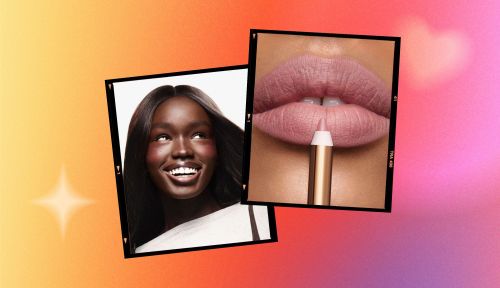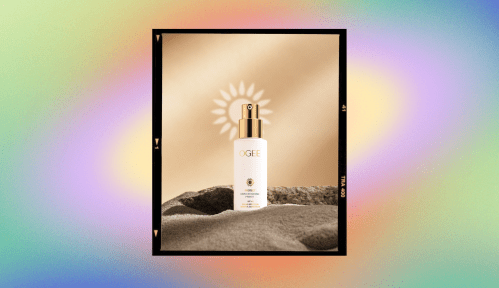Our editors independently select these products. Making a purchase through our links may earn Well+Good a commission
Derms Say This ‘Longevity-Promoting’ Drugstore Routine Will Keep Skin Healthy as You Age
Be proactive with a basic skin-care routine that slows aging *now* so you don't have to do damage control later.
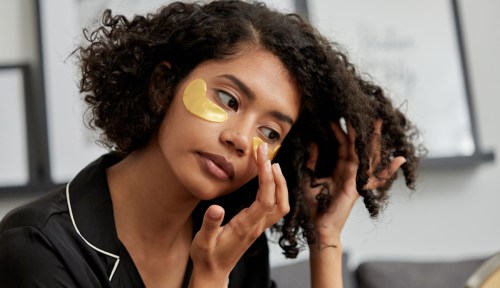
Many of us only start thinking about skin care when a concern pops up—a rogue forehead wrinkle may lead you to invest in a retinoid, and your first sign of discoloration may be what finally gets you see what all the hype around vitamin C is about. But according to dermatologists, healthy skin benefits from being proactive instead of reactive—which means starting a longevity-promoting routine *now* so that you don’t have to do damage control later on.
Experts in This Article
Dr. Sarah Cenac Jackson is a board-certified dermatologist at Audubon Dermatology.
celebrity esthetician and facialist
board-certified dermatologist
While skin type and color can play a role in how quickly skin ages, the environmental factors we’re exposed to throughout our lives, (think: sun exposure and pollution) are the main culprits behind sun spots, wrinkles, dullness, and hyperpigmentation. Most people start to see these visible signs of aging in their 20s, when their bodies’ natural collagen production starts to dwindle, which is why investing in a routine during this decade can be helpful in the long run.
The good news is that taking preventative measures doesn’t mean you have to invest in a laundry list of expensive products. Derms recommend keeping it simple and budget-friendly by using a few effective ingredients that have been proven to promote skin longevity. While you won’t be able to stave off skin aging entirely (remember: it’s a normal and natural part of life), crafting the right routine early on can keep your complexion healthy for the long run.
Morning
Cleanser
“When you’re [in your 20s], you have healthy oil production, so you want to make sure to thoroughly cleanse your skin twice a day,” says Ildi Pekar, a celebrity esthetician and facialist, who adds that clean skin is the basis for any good skin-care routine. Your skin needs to be clean so that any other products you apply can penetrate the skin instead of sitting on the surface, which can clog your pores and lead to acne. Not only can acne lead to scarring, but the inflammation associated with it can also cause collagen damage, says Sarah Cenac Jackson, MD, a board-certified dermatologist at Audubon Dermatology.
For best results, look for gentle, moisturizing formulas, and avoid anything that strips your skin of moisture. If your complexion feels tight or “squeaky clean” after washing, your cleanser is probably too harsh.
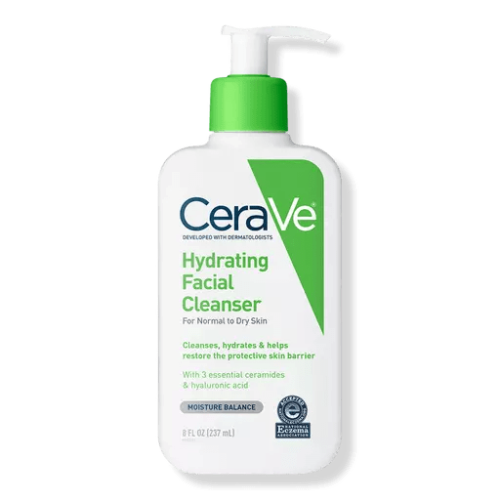
CeraVe Hydrating Facial Cleanser — $15.00
Antioxidants
Antioxidants should be a part of any longevity-promoting a.m. routine because they neutralize free radicals and reduce inflammation—two things that stall collagen and elastin production and contribute to visible signs of aging.
Vitamin C is one of the most popular antioxidants (you’ve probably heard all about it on TikTok), and is beloved for its ability to fend off free radical damage, brighten skin, and fade discoloration. “Niacinamide is another antioxidant that decreases inflammation and redness and helps protect the skin from oxidative stress,” says Dr. Jackson. “And then resveratrol is a compound that is from grapes, that’s an antioxidant that you can use at night. That also helps protect the cells from pollution and UV radiation.”
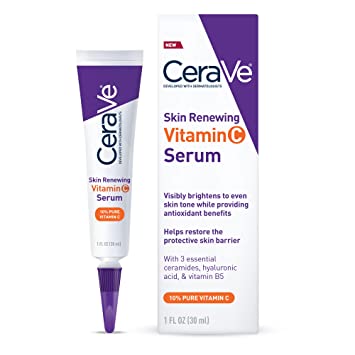
CeraVe Vitamin C Serum — $18.00
SPF
UV exposure, which comes from the sun, is the number one reason for speeding up our skin’s aging process—which is why any derm will tell you that sunscreen is the single best “anti-aging” ingredient money can buy. The UV rays from the sun cause free radical damage, which causes the breakdown of collagen and elastin and leads to overactive melanocytes that cause dark spots.
If you aren’t already, commit to wearing SPF every single day (yes, even if it’s cloudy). “At a bare minimum, wear SPF 30 or higher every single day,” says Robert Finney, MD, a board-certified cosmetic dermatologist at Entière Dermatology..“Put it next to your toothbrush. Most people don’t forget to brush their teeth in the morning, so it’s sort of a good reminder.”
In addition to slathering on an SPF in the morning, it’s critical to reapply regularly (every two hours if you’re spending time outside) to ensure you’re properly protected. To make this as easy as possible, Dr. Jackson suggests people have a “sunscreen wardrobe”. “You should have several sunscreens that you love and that you can use for different occasions,” she says. This looks like having a tinted sunscreen for a no-makeup day, a lighter sunscreen before makeup, and one that’s water resistant when you’re heading out for a jog. After all, the “best” sunscreen is the one you’ll actually wear.
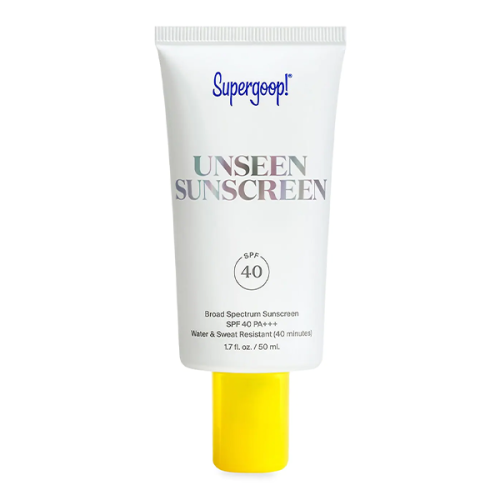
Unseen Sunscreen SPF 40 — $36.00
Evening
Cleanser
Throughout the day, your skin is exposed to dirt, grime, and pollution. If that stuff stays on your face while you’re sleeping, you’re far more likely to experience breakouts. Plus, makeup traps free radicals under your skin, which leads to fine lines and wrinkles. With all of that in mind, it’s extra-important to wash your face before bed.
If you’re wearing makeup, you may want to opt for a double-cleanse to ensure that you’ve gotten rid of all the gunk (start with a makeup remover or oil-based cleanser, then follow up with a gentle foam), but if not, you can use the same cleanser from your a.m. routine to get the job done.
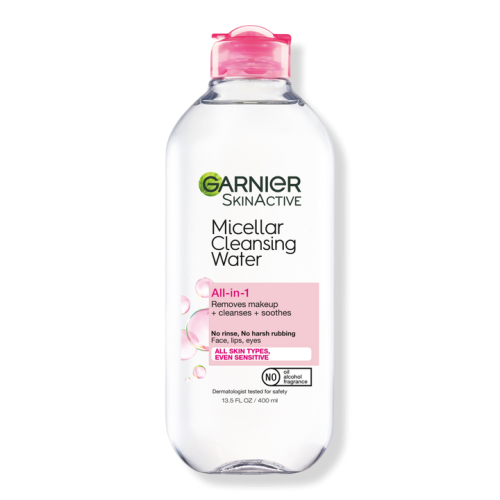
Garnier SkinActive Micellar Cleansing Water All-in-1 Cleanser & Makeup Remover — $10.00
Retinoid
According to Dr. Finney, your evening routine is the best opportunity to focus on collagen-stimulating ingredients and repair any damage that occurred throughout the day, which is where retinoids come in.
Retinoids are one of the best-known ingredients for stimulating collagen production. They work by increasing cellular turnover, which kicks collagen and elastin production into high gear and brings healthy, new skin cells to the surface of your skin to replace any dead, dull ones.
It’s worth noting that this particular active ingredient can cause irritation on certain skin types, so you’ll want to start “low and slow” (aka with a low concentration a few times a week) or opt for a moisturizing formula to give your complexion time to adjust.
If your skin is too sensitive for retinol, Dr. Finney suggests bakuchiol, a plant-based alternative, or peptides. Both have anti-inflammatory properties and effectively work to stimulate collagen.
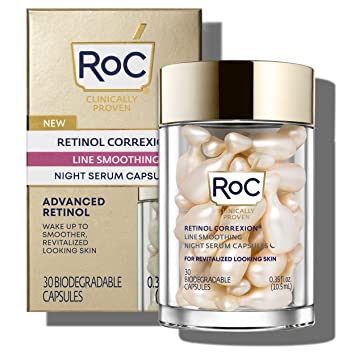
RoC Retinol Correxion Line Smoothing Night Serum Capsules — $22.00
Exfoliant
On nights when you aren’t using a retinoid, you may want to add an exfoliant into the mix. Exfoliating helps to remove dead skin cells from the surface of your complexion, which prevents breakout-inducing clogged pores and stimulates cell turnover to smooth your skin tone and texture. It also stimulates blood flow and therefore collagen production, which results in lessening the appearance of fine lines, wrinkles, and sagging.
For best results, “stay away from harsh scrubs as these can actually scratch the surface of your skin causing damage,” says Pekar. Instead, try chemical exfoliators that contain polyhydroxy acids and lactic acid, especially if you have sensitive skin. Just be sure to limit your exfoliations to three times a week, max, as overdoing it can cause inflammation, breakouts, dryness, and flaking.

Paula's Choice Skin Perfecting 2% BHA Liquid Exfoliant — $30.00
Moisturizer
Regardless of whether your skin is oily, dry, or combination, everyone should be using a moisturizer before bed. Keeping your complexion quenched not only staves off dryness and cracking, but also prevents your skin from overproducing its own oils that can clog your pores and lead to acne. What’s more, hydration is essential for keeping your skin barrier strong, which is important because this barrier is your first line of defense against the elements: It keeps the “bad” stuff, like pollution, out, while holding the “good” stuff, like water, in. Plus, fine lines and wrinkles are more visible on dehydrated skin, so consider moisturizing a must.
Though the type of moisturizer you choose will largely depend on your skin type (oily-skinned folks should opt for a lightweight, oil-free lotion, while those with dry skin can benefit from a heavier cream) Pekar recommends hyaluronic acid-based formulas across the board. The ingredient is naturally found within your skin, and binds with water to help retain moisture. Studies have also shown that in addition to boosting hydration, hyaluronic acid can help plump skin, promote elasticity, and reduce the appearance of wrinkles.
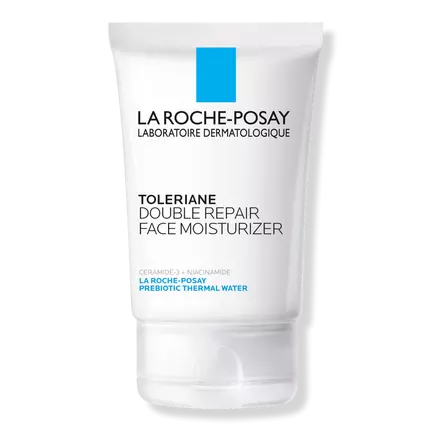
La Roche-Posay Toleriane Double Repair Face Moisturizer — $20.00
Sign up for the Well+Good SHOP Newsletter
Get exclusive deals on wellness, beauty, fitness, and food products that have been hand-picked by our editors.
Got it, you've been added to our email list.



